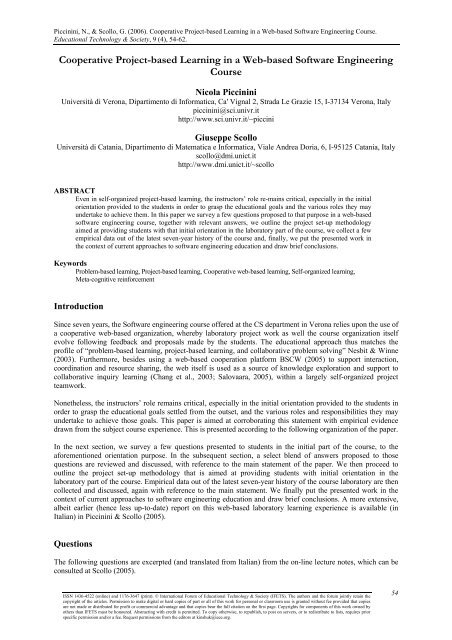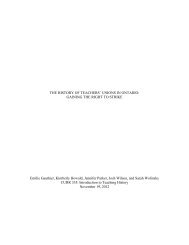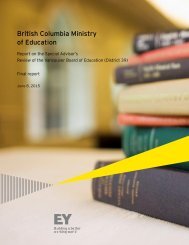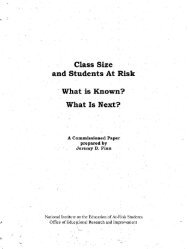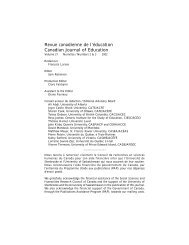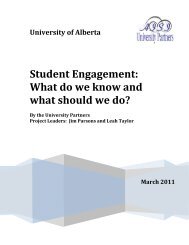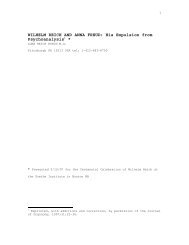October 2006 Volume 9 Number 4
October 2006 Volume 9 Number 4
October 2006 Volume 9 Number 4
Create successful ePaper yourself
Turn your PDF publications into a flip-book with our unique Google optimized e-Paper software.
Piccinini, N., & Scollo, G. (<strong>2006</strong>). Cooperative Project-based Learning in a Web-based Software Engineering Course.<br />
Educational Technology & Society, 9 (4), 54-62.<br />
Cooperative Project-based Learning in a Web-based Software Engineering<br />
Course<br />
Nicola Piccinini<br />
Università di Verona, Dipartimento di Informatica, Ca' Vignal 2, Strada Le Grazie 15, I-37134 Verona, Italy<br />
piccinini@sci.univr.it<br />
http://www.sci.univr.it/~piccini<br />
Giuseppe Scollo<br />
Università di Catania, Dipartimento di Matematica e Informatica, Viale Andrea Doria, 6, I-95125 Catania, Italy<br />
scollo@dmi.unict.it<br />
http://www.dmi.unict.it/~scollo<br />
ABSTRACT<br />
Even in self-organized project-based learning, the instructors’ role re-mains critical, especially in the initial<br />
orientation provided to the students in order to grasp the educational goals and the various roles they may<br />
undertake to achieve them. In this paper we survey a few questions proposed to that purpose in a web-based<br />
software engineering course, together with relevant answers, we outline the project set-up methodology<br />
aimed at providing students with that initial orientation in the laboratory part of the course, we collect a few<br />
empirical data out of the latest seven-year history of the course and, finally, we put the presented work in<br />
the context of current approaches to software engineering education and draw brief conclusions.<br />
Keywords<br />
Problem-based learning, Project-based learning, Cooperative web-based learning, Self-organized learning,<br />
Meta-cognitive reinforcement<br />
Introduction<br />
Since seven years, the Software engineering course offered at the CS department in Verona relies upon the use of<br />
a cooperative web-based organization, whereby laboratory project work as well the course organization itself<br />
evolve following feedback and proposals made by the students. The educational approach thus matches the<br />
profile of “problem-based learning, project-based learning, and collaborative problem solving” Nesbit & Winne<br />
(2003). Furthermore, besides using a web-based cooperation platform BSCW (2005) to support interaction,<br />
coordination and resource sharing, the web itself is used as a source of knowledge exploration and support to<br />
collaborative inquiry learning (Chang et al., 2003; Salovaara, 2005), within a largely self-organized project<br />
teamwork.<br />
Nonetheless, the instructors’ role remains critical, especially in the initial orientation provided to the students in<br />
order to grasp the educational goals settled from the outset, and the various roles and responsibilities they may<br />
undertake to achieve those goals. This paper is aimed at corroborating this statement with empirical evidence<br />
drawn from the subject course experience. This is presented according to the following organization of the paper.<br />
In the next section, we survey a few questions presented to students in the initial part of the course, to the<br />
aforementioned orientation purpose. In the subsequent section, a select blend of answers proposed to those<br />
questions are reviewed and discussed, with reference to the main statement of the paper. We then proceed to<br />
outline the project set-up methodology that is aimed at providing students with initial orientation in the<br />
laboratory part of the course. Empirical data out of the latest seven-year history of the course laboratory are then<br />
collected and discussed, again with reference to the main statement. We finally put the presented work in the<br />
context of current approaches to software engineering education and draw brief conclusions. A more extensive,<br />
albeit earlier (hence less up-to-date) report on this web-based laboratory learning experience is available (in<br />
Italian) in Piccinini & Scollo (2005).<br />
Questions<br />
The following questions are excerpted (and translated from Italian) from the on-line lecture notes, which can be<br />
consulted at Scollo (2005).<br />
ISSN 1436-4522 (online) and 1176-3647 (print). © International Forum of Educational Technology & Society (IFETS). The authors and the forum jointly retain the<br />
copyright of the articles. Permission to make digital or hard copies of part or all of this work for personal or classroom use is granted without fee provided that copies<br />
are not made or distributed for profit or commercial advantage and that copies bear the full citation on the first page. Copyrights for components of this work owned by<br />
others than IFETS must be honoured. Abstracting with credit is permitted. To copy otherwise, to republish, to post on servers, or to redistribute to lists, requires prior<br />
specific permission and/or a fee. Request permissions from the editors at kinshuk@ieee.org.<br />
54


